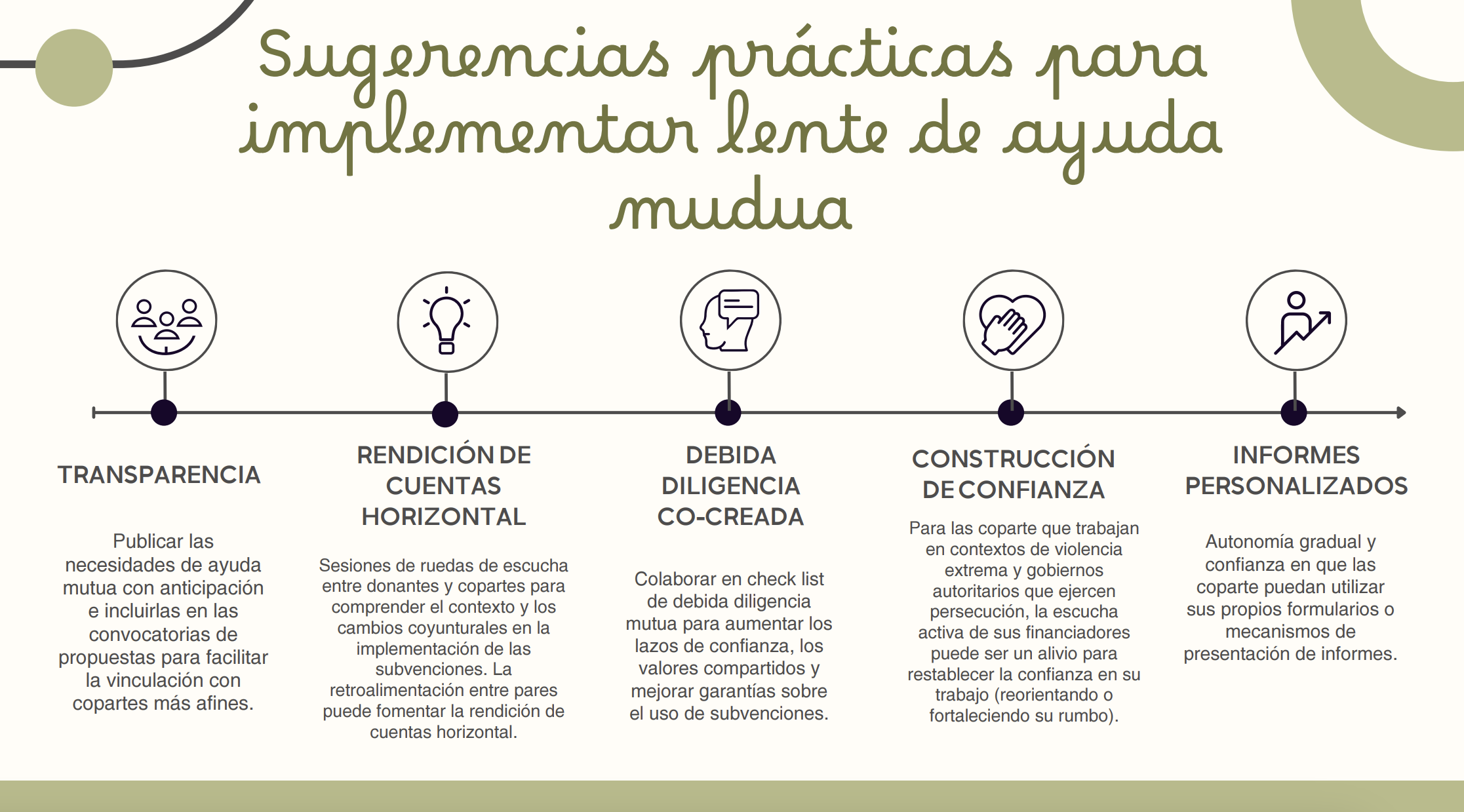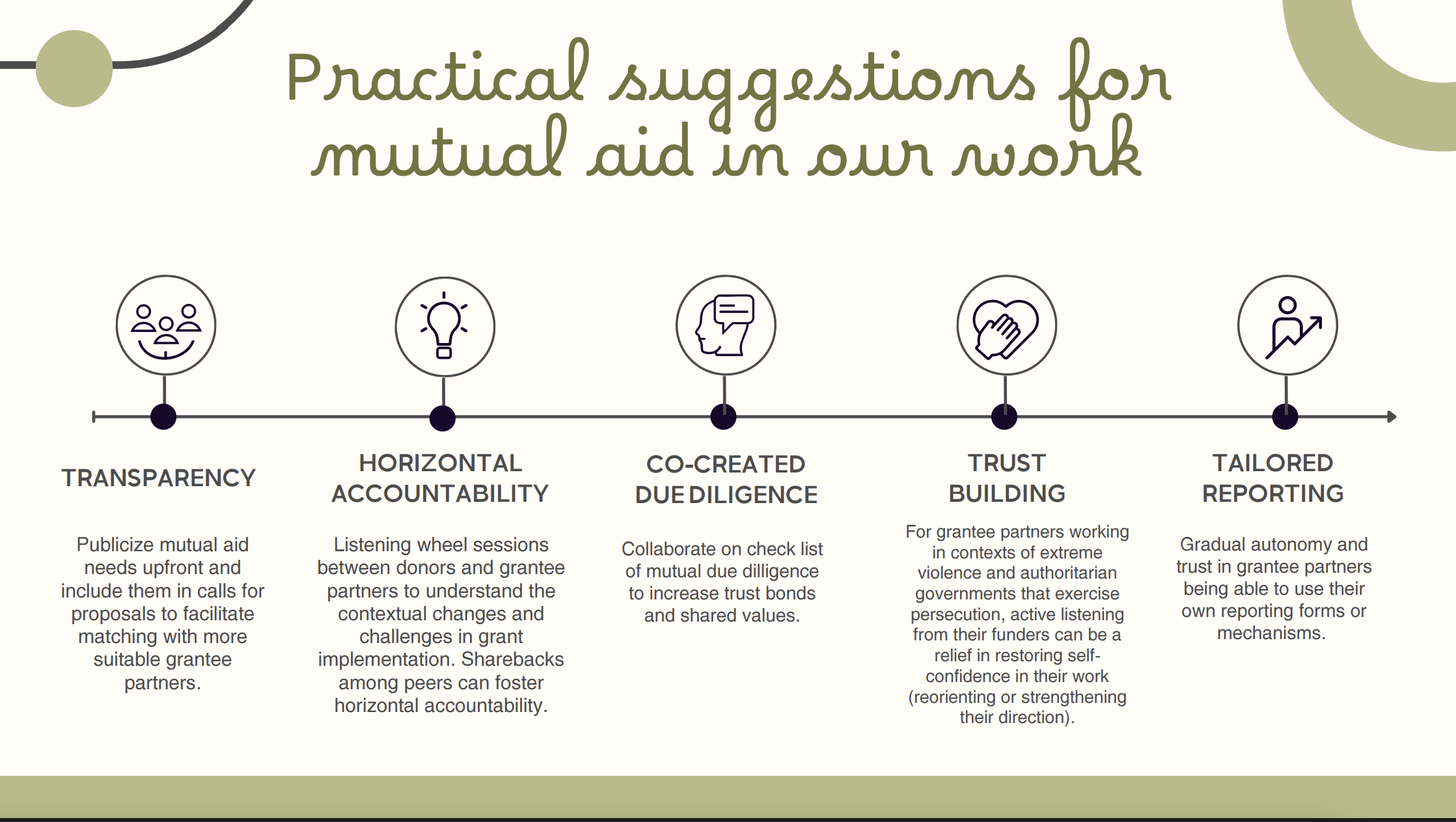May, Wednesday 21, 2025
In the current global context of polycrises, development aid funding cuts, and political climate of deliberately induced chaos and confusion, large population sectors, social justice movements, and, more gravely, marginalized communities at the interstices and crevices where systems of power start dismantling are recurrently put on survival mode of constantly seeking and competing for resources.
How do we step out of survival mode if our survival responses are rooted in competition? How do we aim to build more transformational –rather than transactional– partnerships that can better resist the context’s’ pull towards division and multidirectional animosity? These questions guided this session’s conversation on how mutualism and mechanisms of mutual aid can be a way out of that loop.
Intentional trust-building can facilitate correlative accountability and nourish a creative disruption of contrived scarcity. FRIDA|The Young Feminist Fund and Ecuadorian journalist collective La Periodica showcased this through their ways of working that resisted narratives of competition and movement fragmentation despite constricting contexts.
More on La Periodica’s Escuela de Comunicación Feminista, known as La Ortiga:
In 2017, La Periódica was launched as Ecuador’s first media outlet rooted in a feminist narrative lens. Building on this foundation, the Escuela de Comunicación Feminista, known as La Ortiga, was created in 2020 to deepen the impact of feminist journalism across the country.
Why the name La Ortiga? The plant is known not only for its medicinal properties—stimulating blood circulation and healing—but also for its sting when touched. This dual nature reflects the mission of feminist journalism: to provoke and challenge when necessary, while also offering paths toward social healing and transformation. In other words, when feminist journalism “stings,” it also activates.
Mutual Aid Principles at La Ortiga:
- Born in Quito, La Ortiga was envisioned as a space to decentralize feminist media practice by sharing knowledge with communities beyond the capital. The school became a platform for mutual learning: participants were trained in journalistic and technical skills, and in return, they produced stories and content that expanded La Periódica’s reach and narrative diversity. This model of mutual aid emphasized the value of shared expertise, especially in contexts where financial resources were limited.
- Through the above mentioned exchange, La Ortiga contributed to building a collective memory of Ecuador’s LGBTI movements. Participants received training in audiovisual storytelling, advocacy for LGBTI rights, and holistic security practices to protect their well-being as they produced content. These skills allowed them to not only tell stories, but to do so safely and strategically.
- La Ortiga operates on the principle that knowledge should be public. The materials produced by the school—articles, audiovisuals, resources—are made openly available through La Periódica. This reflects their commitment to transparency, collective empowerment, and feminist principles of sharing information and strengthening communities through communication.
More on FRIDA | The young feminist fund and its Reverse Call for Applications:
This year, FRIDA – a youth-led feminist fund that supports young feminist activists around the world by mobilizing resources, funding, and strengthening leadership – is launching its First-Ever Reverse Call for Applications, an important milestone within FRIDA’s Transition Strategy to support grantee partners after their formal funding cycle ends.
How does this work? Transitioning grantee partners, along with alumni (former grantees), were invited to nominate new feminist collectives from their own regions—especially those that are newly formed and typically excluded from traditional funding spaces. After nominations, the applicants themselves vote to decide where the grants go.
This represents a deepened model of participatory grantmaking that now stretches across the full lifecycle of the funding relationship—not just at the beginning, but also at the end.
Specifically, in September (register here if interested in knowing more), they’re piloting an online space that highlights the journeys of grantee partners transitioning out of funding. Instead of making these groups start from scratch to find new funding, FRIDA is inviting donors to apply to support them.
Mutual Aid Principles at FRIDA:
- Launching such an initiative represents an experimental, flexible way to reimagine donor engagement that puts the focus on solidarity, not bureaucracy. This helps grantees to stay connected, build relationships with other donors, and ease into future fundraising.
- With the new previously mentioned Reverse Call for Application, FRIDA shows to approach mutual aid far beyond financial grants. FRIDA recognizes that relational and knowledge capital—like networks, connections, and visibility—can be just as valuable. As an intermediary between grassroots groups and larger foundations, they help open doors for their partners, sharing the influence and access they’ve built. Hence, FRIDA aims at creating a more caring, feminist model for how philanthropy can work—one that doesn’t leave collectives behind.
- Much like La Ortiga from La Periódica shares knowledge to grow feminist media, FRIDA shares relationships to keep young feminist movements connected, supported, and thriving—even after the grants end.
Practical Suggestions for Mutual Aid:
Thank you to the Speakers
-
Davina Rojas Murga
FRIDA | Senior Programs Officer (Grantee Partner and Transition Process) and LA Focal Point.
Reach out to her for any follow up at davina@youngfeministfund.org.
-
Daría
La Periódica | Co-Editora.
Reach out to them for any follow up at daria@laperiodica.net.



Leave a Reply
You must be logged in to post a comment.